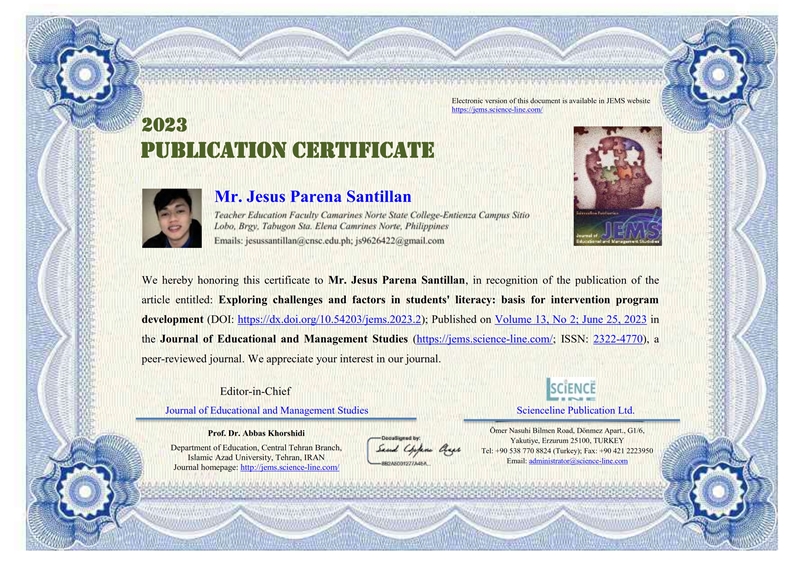Previous issue | Next issue | Archive
Volume 13 (2); 25 June, 2023
Research Paper
|
|
Exploring challenges and factors in students' literacy: basis for intervention program development
Santillan JP.
J. Educ. Manage. Stud., 13(2): 14-22, 2023; pii:S232247702300002-13
DOI: https://dx.doi.org/10.54203/jems.2023.2
Abstract
This study employed a descriptive-exploratory research design using the Participatory Rapid Rural Appraisal (PRRA) approach, a participatory research method designed to elicit insights from the local community. PRRA facilitated the identification of literacy challenges within selected schools, fostering a collaborative effort with representatives from various sectors in Barangay Tabugon, Sta. Elena Camarines Norte, Philippines. By engaging these stakeholders, the study aimed to comprehensively address critical issues, including limited resources, overcrowded classrooms, and insufficient parental involvement, all of which significantly impact effective learning. The findings suggest evidence-based intervention strategies to improve literacy outcomes and contribute to the community's holistic development. The study recommends the implementation of a literacy enhancement and assistance program for the community.
Keywords: Literacy challenges, Participatory Rapid Rural Appraisal (PRRA), Students' literacy, Intervention strategies
[Full text-PDF] [Crossref Metadata] [Export from ePrints]
Research Paper
|
|
Instructional supervision: best management practices in secondary schools in Kinondoni municipality, Tanzania
Emanuel D and Mwila PM.
J. Educ. Manage. Stud., 13(2): 23-36, 2023; pii:S232247702300003-13
DOI: https://dx.doi.org/10.54203/jems.2023.3
Abstract
Quality of learning depends much on classroom management, and instructional supervision always helps to alert the teacher in managing class. Instructional supervision practices engage teachers and their principals in a mutual relationship for the sole purpose of developing, maintaining and improving a school’s instructional programme, especially its curriculum and teaching personnel in attaining quality of education. This study intended to explore the best practices of instructional supervision management in selected secondary schools in Kinondoni Municipality. Specifically, it was aimed at examining the perception of teachers about instructional supervision practices and identifying exemplary/best practices of instructional supervision techniques practiced in secondary schools and lessons drawn from them for other institutions. The study used both qualitative and quantitative approaches and a descriptive survey design. It relied on a sample size of 159 participants, including parents, heads of schools, heads of departments, teachers and students from five selected secondary schools. The data were collected through interviews, questionnaires, document reviews, and observation and were analysed through descriptive statistics and content analysis. The findings of this study revealed that the majority of teachers had negative attitudes towards instructional supervision as a result of unfriendly supervisory practices by heads of schools and heads of departments. The supervisors failed to create a friendly environment with their supervisee to the extent that the teachers perceived instructional supervision as a mere implementation of the stipulated policies. The study further observed that the supervisors lacked adequate training apart from being too occupied by administrative roles and hence forgetting supervisory activities. The study established that teachers in secondary schools perceive instructional supervision as more fault finding rather than supporting them in improving their teaching practices. The focus of school-based supervisors ought to be on assisting teachers in enhancing their teaching and learning processes to better administer instructional supervision. Instructional supervision must place more emphasis on improving than on proving.
Keywords: Internal school supervision, Supervision practices, Supervision techniques, Secondary schools, Tanzania
[Full text-PDF] [Crossref Metadata] [Export from ePrints]
Previous issue | Next issue | Archive

